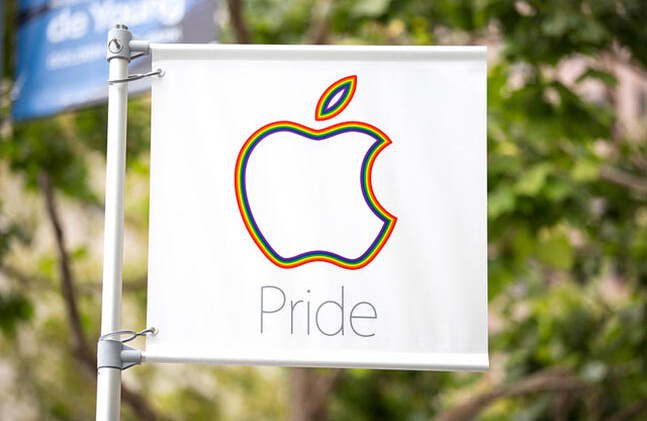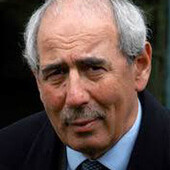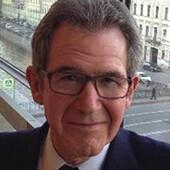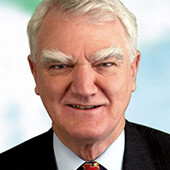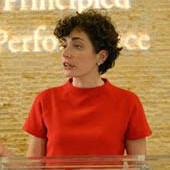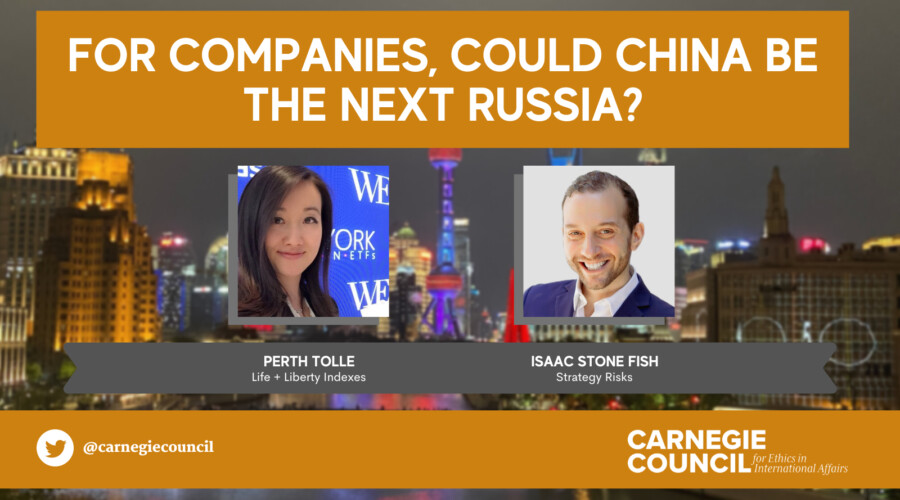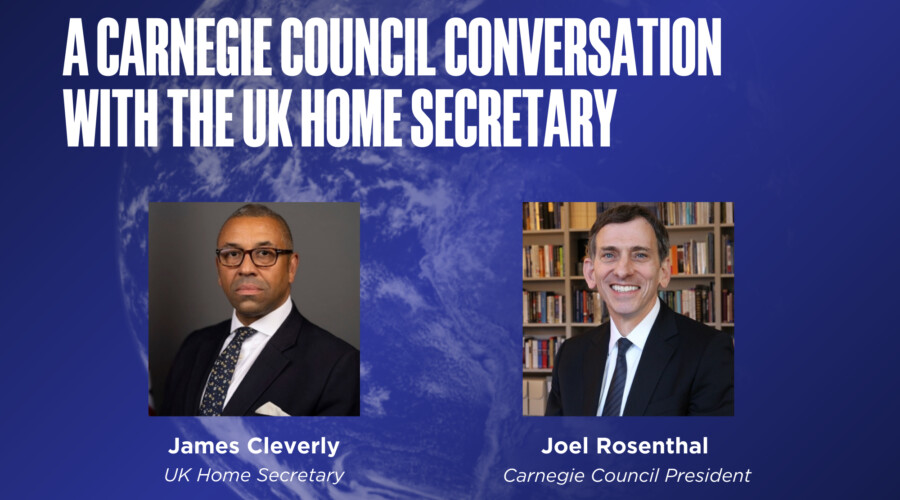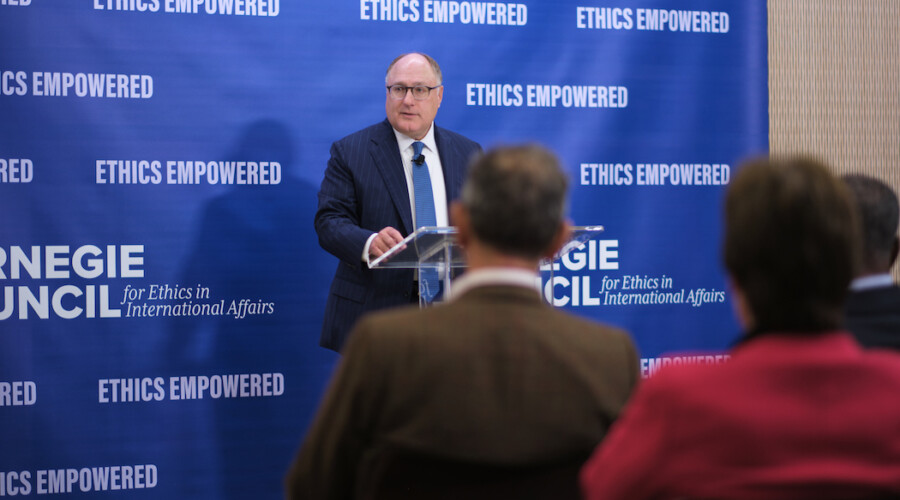Corporate leaders' influence reaches beyond the walls of their businesses. How do they use that power, and what are the ethical, business, and political consequences? Discover how BP's John Browne and Shell's Mark Moody-Stuart influenced politics in oil-producing countries and how Browne and Apple's Tim Cook weighed in on LGBT issues. *This podcast was amended on August 3, 2015; see transcript.
JULIA TAYLOR KENNEDY: You're listening to Impact from the Carnegie Council. I'm Julia Taylor Kennedy.
Each episode, we explore a topic in global business ethics. This time it's the rise of CEO activism. After all, CEOs seem to be getting more political these days. Over the course of the next half hour, we'll share a lot of stories about CEOs and social consciousness. We'll talk with CEOs and experts about how heads of large companies have started taking hold of a kind of corporate bully pulpit. We'll explore their motives and the kind of impact they have when they wield their influence.
JOHN BROWNE: I think you look around and ask yourself, "Where's my firsthand experience? Where can I most effectively contribute?"
My name is John Browne. I am an author, and I am a businessman.
JULIA TAYLOR KENNEDY: Specifically, Lord John Browne is an oil executive. He's former CEO of BP, and he resigned in 2007 when he was caught lying in an affidavit about engaging in an affair with a male escort. Last year, Browne published a memoir called The Glass Closet. He was the first CEO of a Fortune 500 company to come out and talk about it openly.
JOHN BROWNE: There were a lot of things I learned about being in the closet. They were not good. I wanted to talk about that so that people could perhaps take away some lessons from my own experiences where I made a whole series of mistakes.
JULIA TAYLOR KENNEDY: Since publishing his book, Browne has become a public advocate for more inclusive global workplaces. And he has a whole set of best practices for how to create a better workplace for LGBT [lesbian, gay, bisexual, transgender] colleagues.
JOHN BROWNE: Well, I think first of all it's very important that the organization feels secure in themselves that they've made it safe for people in their organization to come out. You need to know who's gay and who's not gay and they need to be very contented to volunteer that information and feel that it doesn't get in the way.
I think then if you've got operations in the country where there are laws against having a homosexual act, there's no reason you couldn't send a gay person there so long as both sides understand what it entails, which is not breaking the law. No individuals must break the law, because they'll be exposed to whatever form of justice system or police system will be used. The mere fact that they're there demonstrates to people that of course this is a wrong basis for selection, someone's sexuality. It's about merit and contribution.
I think, further, you can, with great care, say that within the walls of your company, "You can be who you are." You have to be careful about that because you don't want someone to leave the confines of your company's office only to be beaten up on the street when they leave the front door.
You don't want to improve someone's rights and expose them to danger in so doing, unless they knowingly want that to happen.
JULIA TAYLOR KENNEDY: Browne has given countless media interviews on these issues. He says he speaks regularly with CEOs and with public officials who are wrestling with the questions related to LGBT rights. And Browne isn't alone—Apple's CEO Tim Cook came out of the closet recently, and he's started speaking out about rights in the workplace. Many other CEOs have also spoken out in favor of LGBT rights.
CEOs and high-powered executives aren't just talking about LGBT rights. When he was still in office at BP, John Browne was already championing sustainability. And he's releasing another book called Connect on the relationship between corporations and the countries where they operate.
Salesforce's Marc Benioff and Facebook's Sheryl Sandberg speak about gender equality at work. Starbucks' Howard Schultz is passionate about the minimum wage. The list of CEOs and top executives talking about social issues grows longer every day. To find out more about what drives CEOs to get involved in these causes, I called up someone who has written countless biographies of high-profile power players.
TOM BOWER: My name is Tom Bower. I'm a journalist and writer.
JULIA TAYLOR KENNEDY: To Bower, CEO activism is just hubris.
TOM BOWER: I find that whenever businessmen enter into the realm of politics or philanthropy, the reasons are usually suspicious. It is either because they see the philanthropy as a way of minimizing the bad image of their business or they see it as a way of self-promotion because they want to use their financial and industrial muscle to promote themselves as people who are power brokers in the world. They bask in the publicity of the spotlight.
When they go into philanthropy and politics too far, their businesses suffer because they take their eye off the ball, which is to make profits, and they exercise compromises that actually damage their businesses.
JULIA TAYLOR KENNEDY: In addition to writing some pointed, unauthorized biographies of individual CEOs like Virgin Group founder Richard Branson and media tycoon Conrad Black, Bower wrote a book on the history of the oil industry. It was published just before the Deepwater Horizon oil spill in the Gulf of Mexico in 2010, which occurred on an oil rig leased by BP at the time of the incident.
TOM BOWER: John Browne became obsessed with promoting himself as a great warrior of improvement and worldwide philanthropy.
JULIA TAYLOR KENNEDY: But of course, John Browne tells the story a little bit differently.
JOHN BROWNE: Over time, it became pretty obvious to, not just me, but to a large number of people in BP that while, on the one hand, we were producing something that was very important for the future of the world, which is hydrocarbons, oil and gas, and that those were part of the solution of bringing billions of people out of poverty, not least in a place like China, on the other hand, the excessive use of hydrocarbons and burning carbon meant that the probability of doing something bad to the climate of the world became more and more clear.
We said, "Well, we have to, on the one hand, do our business but do it better and better in a more sustainable way and, on the other hand, recognize that we have to reduce carbon going to the atmosphere."
JULIA TAYLOR KENNEDY: So, Browne made a big speech at Stanford University in 1997 to announce that BP was going to start working on sustainability in the oil and gas business.
JOHN BROWNE: It was not well-accepted, I think, by other members of the oil and gas community at the time I did it. In fact, I think the principle lobby group said that BP had "left the church," whatever that meant. But as time went on, more and more people got on to the point that you have to do both.
You cannot deny people development. But equally, you want to maintain the world for the future. So how do you balance those two things? Business cannot simply go around saying, "Well, we'll do our business. Then we'll add a Band-Aid on called, 'a little bit on the climate' or a Band-Aid saying, 'a little bit on human rights' or a Band-Aid, 'a little bit of something to do with LGBT activity.'"
This is part and parcel of business. It's actually at the decision-making level of everything that you think about.
JULIA TAYLOR KENNEDY: But according to Bower, as Browne started to prioritize sustainability at BP, he stopped paying attention to some really important parts of the business.
TOM BOWER: He resigned at a time when he had weakened BP. He weakened it by over-focusing on himself, his politics, his philanthropy, and the environment.
JULIA TAYLOR KENNEDY: Bower says with that distraction, Browne cut costs and ignored worker safety—to horrific consequences for his company and for the environment.
TOM BOWER: That directly led to the disaster in the Gulf of Mexico, the blowout at Deepwater Horizon. That is where I believe that however well-intentioned, an aggressive oil man, a successful oil man, can't also be a politician and philanthropist. The two don't go together.
JULIA TAYLOR KENNEDY: The causes for the blowout at Deepwater Horizon are complicated, and Browne disagrees with Bower's analysis of what happened.
Of course, an oil man has to engage in politics every now and again. And even Bower admits in developing countries, it can be really hard for an oil company to avoid exerting any influence. Take the story of Royal Dutch Shell in Nigeria.
TOM BOWER: Nigeria is a very oil-rich country. But it is also a completely chaotic and corrupt society. Plagued by warring tribes. Plagued previously by a dreadful civil war which the country never recovered from.
JULIA TAYLOR KENNEDY: False borders imposed during colonialism in the 19th century led to ongoing unrest in Nigeria.
TOM BOWER: Unfortunately, the reaction against colonialism meant that Shell was completely hamstrung. They wanted just to drill oil and remit a huge part of their profits to the government in royalties. They expected the Nigerian government to improve the country with the oil revenues. But they found a succession of problems.
JULIA TAYLOR KENNEDY: First, the money Shell gave to Nigeria disappeared.
TOM BOWER: The government ministers took the money put it in their pockets and didn't spend it in the country.
JULIA TAYLOR KENNEDY: Then, people started tapping Shell's oil pipeline for their own use.
TOM BOWER: There was an enormous amount of theft on the way by local people from the oil pipelines. There was very little Shell could do about it because they didn't have the cooperation of the local people or the government to stop that practice.
JULIA TAYLOR KENNEDY: So, Shell began to retreat from drilling on Nigeria's land and started to drill only at sea.
TOM BOWER: They hoped that would provide security but that also became a problem with kidnappings because oil created greed. Shell found itself in a completely unprecedented situation, where they were providing huge wealth to Nigeria but also were the source of its financial corruption. What could the company do?
Their solution was to do nothing. They didn't want to become involved in the politics of Nigeria. They wanted to allow a sovereign country to run itself and that ran into spectacular problems.
JULIA TAYLOR KENNEDY: Those problems culminated in a tragedy—and a nightmare for Shell's reputation. Here, I'll hand the storytelling over to Mark Moody-Stuart, former chairman of Royal Dutch Shell and a top-ranking executive in the company in the 1990s, when everything came to a head.
MARK MOODY-STUART: Ken Saro-Wiwa, who had an interesting background—he was a very able man, a well-known writer, a producer of successful television series. He'd been a commissioner for the federal military government. He was a successful person, but he believed passionately that the Ogoni people had, ever since colonial times, had the short end of the stick, that they had not been recognized as a group, so he worked on that.
JULIA TAYLOR KENNEDY: The Ogoni were a tribe that had lived in the oil-rich region of Nigeria for centuries. And they experienced many oil spills when Shell set up in the region in the 1950s and in the decades that followed. Ken Saro-Wiwa led protests of both the government and Shell's operations in the area, which ended in village raids and other violent government actions.
MARK MOODY-STUART: He was relatively open with Shell people that actually his argument was less with Shell and more this question of autonomy for the Ogoni people. And he said Shell is useful to me because I get international attention through these protests, but my real target is to make sure that the Ogonis have autonomy.
JULIA TAYLOR KENNEDY: Saro-Wiwa wrote an Ogoni Bill of Rights to set out the movement's demands, and he organized a peaceful march of 300,000 Ogoni people in 1993. Then, in 1994, four Ogoni chiefs who disagreed with Ken Saro-Wiwa were brutally murdered. Although he was nowhere near the scene of the crimes, the government accused Saro-Wiwa of inciting violence to cause the murders and they arrested him.
MARK MOODY-STUART: Ken Saro-Wiwa absolutely did not intend this. It wasn't something that, in my opinion, that in any way he would have incited or wished for but, you know, people don't always control what more extreme people in the movement do.
So Shell called for a fair trial. We did not criticize the trial, probably partly because we called for a fair trial, so you might say there's an implicit criticism.
JULIA TAYLOR KENNEDY: It was a military trial without appeal.
MARK MOODY-STUART: So it was a bad trial, and Ken Saro-Wiwa and the rest of the group were sentenced to death.
JULIA TAYLOR KENNEDY: Because of a similar past trial in Nigeria, Mark Moody-Stuart says he didn't think the death sentence would be enforced.
MARK MOODY-STUART: So we thought, this will go into the long grass and eventually it will all be forgotten about and not end in execution, and that I think was believed. I've seen Ken Saro-Wiwa's daughter has said that that was her belief and the family belief at the time that it wouldn't be carried out.
But all of a sudden we got a message that it really was likely that it would be and that caused a great deal of anxiety. We'd already appealed for clemency, so we stepped up efforts, but it was completely unsuccessful
JULIA TAYLOR KENNEDY: In essence, Shell took the blame for Ken Saro-Wiwa's death; for failing to support his right to protest and to take his demands and criticisms seriously, for perhaps supporting the military government that killed him. Mark Moody-Stuart took this experience as a lesson about the role a top executive of a corporation can—and should—play in society.
MARK MOODY-STUART: We could have perhaps been, and I think we would have been, more outspoken in criticizing the nature of the trial.
JULIA TAYLOR KENNEDY: At the time, Shell had a strict policy of respecting a nation's sovereignty and not meddling in local politics. But since that tragedy in 1995, Shell has revised its policy to encourage more engagement.
MARK MOODY-STUART: We tended to assume that the visible authority structures, local chieftaincies, were in fact the actual authority structure and that they were stable, and they were not. So we would do local road-building and so on specifically to give employment to the community. We would tend to do that through the head of the community. That head of the community did not always pass the benefits on and might even have employed people from outside the community, which caused stresses. So I think perhaps inadvertently we had—so that's what we would do differently.
I think nowadays any company going into a situation like that needs to work with civil society organizations or a civil society organization who can work with the community to look and make sure that they have those government structures.
JULIA TAYLOR KENNEDY: The engagement Mark Moody-Stuart advocates isn't exactly the same as the CEO activism we're seeing cropping up today. In fact, Moody-Stuart feels pretty strongly that companies—and CEOs—should stay out of politics when it doesn't directly affect their operations.
MARK MOODY-STUART: So what do you do when you operate in a country with a lousy government, a weak government perhaps lacking in capacity, a government which may actually be highly corrupt and so on?
You cannot act as a single company. I think that is generally quite incorrect, wrong, and you can't even as business alone act because if business acts to try and influence government, it will influence it in a business-friendly way. So you need to bring in civil society, and that's the most encouraging thing in the last 20 years, is the development of cooperation between civil society and business to address very specific problems and make real progress.
JULIA TAYLOR KENNEDY: But walking that line between watching out for your company, engaging with civil society, and using undue influence can be really tricky. Especially if you strike up an ongoing relationship with a head of state.
Moody-Stuart became particularly close with Syrian dictator Hafez al-Assad, father of the current Syrian president Bashar al-Assad, as Shell remained active in Syria under Assad's rule. Moody-Stuart and Assad talked about everything from labor rights to liberal economics.
MARK MOODY-STUART: He could see the need for economic development, for freeing up the economy and so on, but he was paranoid about doing it too fast because he would say, "Look at Russia. The place collapsed, you know."
JULIA TAYLOR KENNEDY: Then, one day, Assad changed the subject.
MARK MOODY-STUART: He had the former minister of energy under house arrest. He said, "You see we have a new minister."
And I said, "Yes."
He said, "What do you think about that?"
I said, "It's your sovereign right to appoint whoever you want as minister, but just know that the previous minister did, in my opinion, an outstanding job for Syria and that Syria has much to be grateful to him and so do we because we would never have developed the industry without his assistance."
So he said, "Do you think he should be allowed to retire in peace?"
So I said, "Yes, I do."
He said, "But he's a very active man. He might not retire in peace."
And so I said, "I'm sure if you tell him to retire in peace, he will."
So he let him out and allowed him to travel, etc.
JULIA TAYLOR KENNEDY: Talk about influence. In this case, Moody-Stuart feels he saved the former energy minister's freedom, if not his life.
MARK MOODY-STUART: Somebody said to me, "If you're dining with the devil, you come out smelling of sulphur." That's true if you're not careful. Who's influencing who?
It's extremely tricky, and I think you need help and advice on that, and you need to think very clearly about it. Probably it's not appropriate for everyone.
JULIA TAYLOR KENNEDY: Because Moody-Stuart strongly believes in engagement, he's not a huge fan of the boycotts we're starting to see CEOs talk about in the media. That includes the threat some CEOs made when Indiana passed the religious freedom law allowing businesses not to serve LGBT clients.
MARK MOODY-STUART: I don't know all the details. I would not withdraw from a state unless I felt that the state was forcing me to do things with employees which were against my principles.
JULIA TAYLOR KENNEDY: Moody-Stuart may not endorse this approach, but the phenomenon has caught the attention of scholars.
AARON CHATTERJI: Aaron Chatterji, I'm an associate professor at the Fuqua School of Business at Duke University.
Together with my colleague Michael Toffel at Harvard Business School, we've been studying corporate social responsibility for quite some time.
We started to see something new with CEOs like Howard Schultz, and COOs like Sheryl Sandberg, and other corporate leaders speaking out about social issues that were, in many cases, unrelated to their businesses. We termed this "CEO activism" in our Harvard Business Review piece, and started a whole research agenda on this topic to figure out: Why were CEOs speaking out? What was the impact? And what we could expect in the future from corporate leaders?
JULIA TAYLOR KENNEDY: Now, the way Chatterji sees CEO activism is very different from your standard approach to corporate social responsibility, or CSR. In traditional CSR, you'd have a CEO saying their company needs to do certain things to help society. CEO activism isn't even that more holistic approach to sustainability that Lord Browne undertook at BP, or that Pepsico CEO Indra Nooyi is using as she is trying to bake global health into the core operations of her company.
AARON CHATTERJI: In contrast, what Howard Schultz is doing when he's speaking out about race, or what Tim Cook is doing when he speaks out about sexual orientation and gay rights, is something very different. It's of course related to what people at Apple and Starbucks might believe about certain issues, but it's not as intimately related to the bottom line, in our view, as Indra Nooyi's activism on food and beverage products are. We see CEO activism as speaking out on social issues that are largely unrelated to the firm's bottom line. That's what makes this so interesting.
JULIA TAYLOR KENNEDY: Of course, Chatterji knows CEOs have spoken out about political issues before.
AARON CHATTERJI: Henry Ford published an article about capital punishment back in an earlier era. There were CEOs speaking about the Prohibition movement, women's rights and suffrage, the Civil Rights Movement, gun control, and a wide variety of issues. There has been, it seems, a "boomlet," if you will, of CEOs speaking out more recently.
JULIA TAYLOR KENNEDY: He thinks it might come from a sense of frustration with U.S. politics.
AARON CHATTERJI: When you hear CEOs talking at corporate round tables and at retreats and conferences, they often lament the political gridlock in Washington and some state capitals. There's the sense that if we could be less ideological, less partisan, talk about the facts, that we could get more done.
I think a lot of CEOs of different political persuasions are hoping to break that logjam by jumping into the public debate. I think that's what you're seeing with many of the recent examples we talked about.
JULIA TAYLOR KENNEDY: But the impact of CEOs using that megaphone they're afforded by their stature remains unclear.
AARON CHATTERJI: We ran a field experiment with a market research company called CivicScience. I should disclose that I'm an equity-compensated advisor to CivicScience.
JULIA TAYLOR KENNEDY: Together, CivicScience and Chatterji's team wanted to understand the effect of a specific example of CEO activism. When Indiana passed its Religious Freedom Restoration Act, allowing business owners to refuse to serve LGBT customers, Apple CEO Tim Cook was one of its most vocal critics. He published an op-ed in The Washington Post and put out several tweets that went viral. So the research team wanted to understand whether these activities influenced public opinion.
AARON CHATTERJI: We used their platform to ask people all around the country questions about their attitudes toward Indiana's law, and their intent to buy Apple products.
By running this experiment with different preambles to our questions regarding Tim Cook's statement, we were able to isolate an impact of hearing Tim Cook's views on RFRA—as they call it in Indiana, the religious freedom law—and willingness to buy Apple products.
JULIA TAYLOR KENNEDY: The results were pretty surprising.
AARON CHATTERJI: We found the public opinion didn't shift very much when Tim Cook spoke out.
What we've found is when people hear about Tim Cook's views, they are more likely to buy Apple products.
In some sense, the preaching to the choir effect might be much more powerful than changing people's minds.
JULIA TAYLOR KENNEDY: So a cynical listener might think this kind of political speech is just a marketing ploy. Chatterji isn't sure that's the whole story. After all, some CEOs' political views have actually hurt their reputations.
AARON CHATTERJI: It's not just CEOs who are speaking out for progressive issues, but also folks who are speaking out in more conservative positions. By and large, those haven't necessarily been received as well.
CEOs like Dan Cathy, who expressed support for traditional marriage, came under a lot of criticism, and threats of boycotts of Chick-fil-As on college campuses.
JULIA TAYLOR KENNEDY: Chatterji does think that the boost in Apple sales after Tim Cook spoke out against the Indiana law says something about public opinion in the United States.
AARON CHATTERJI: It does feed this notion that we're already pretty dug in, and our views are pretty set on some of these controversial issues. It's really hard for a single individual to change somebody's mind. What we did see was sort of signaling which side of the cultural divide Apple and Tim Cook were on, and that was very powerful.
I think that this notion of choosing sides and telling people who are with you that you're with them is as important as any change in public opinion from the CEO activism comments.
JULIA TAYLOR KENNEDY: So CEOs could strengthen the resolve of folks who already agree with them politically—and boost their company's revenues. Now, CEOs continue to meet privately with political figures too.
AARON CHATTERJI: With the Indiana law specifically, I know that the legislators in that case were meeting with business leaders all the time.
I think there is something really powerful, though, about these large public statements—the op-eds by Tim Cook and others in The Washington Post; in his case, the tweets that got lots of retweets and lots of favorites. These things create the buzz and a momentum that really couldn't have been accomplished with behind-the-scenes meetings.
JULIA TAYLOR KENNEDY: Taking on an international issue like John Browne did with global LGBT rights adds another level of complexity for CEOs.
AARON CHATTERJI: For a CEO to speak out about something in their own country where the primary location of their business is and where they're deriving most of their revenue and profits is one thing. To make statements about a country half a world away where they don't necessarily have as much of a foothold, or their power could be under more scrutiny, or they might be blocked from entering that market in the future, it's certainly a lot more risky.
In the international context, there's a risk of overstepping our bounds and meddling into the affairs of these developing countries and their governance. Certainly, there's been a long history to learn from there.
JULIA TAYLOR KENNEDY: And Chatterji thinks that as CEOs look for a reputational boost by speaking out on one issue that will endear them with the public, they may look to diminish scrutiny on other corporate behavior, say on safety or labor rights.
AARON CHATTERJI: Perhaps not speaking out on labor rights on one hand, but speaking out forcefully on a domestic issue where the country is behind you, there's some sort of compensation. We haven't done the research on that particularly, but I know a lot of people think about this when they analyze what CEOs speak about and what they don't speak about.
JULIA TAYLOR KENNEDY: Chatterji shared a few rules of thumb that he thinks can help guide CEOs when they think about becoming politically active.
AARON CHATTERJI: I would advise them that people are going to listen to you if you speak out. Choosing your spots is very, very important. It should be an issue that you have real credibility on. I think, to the point, Tim Cook has real credibility on these issues related to discrimination against LGBT individuals, partly because of his own background and his cover story in BusinessWeek about his own background.
Secondly, speaking out when there's actually a debate or a flashpoint like there was in Indiana, is really important to maximize the impact.
I would say, the last thing is also being humble enough to listen to the other side, to compromise and to figure out ways to reach a solution. I think what Americans, at least, are looking for in their business leaders is some of that pragmatism that we don't see in other parts of society. It's not just your way, or my way or the highway, but it's actually trying to find a real solution.
JULIA TAYLOR KENNEDY: When it comes to exerting political influence, CEOs have to also think about the moral implications.
AARON CHATTERJI: Almost every moral or ethical dilemma has its roots or can be explained by a line from a comic book. For this one, I would say, "With great power comes great responsibility." CEOs are listened to. They're listened to because they're job creators. They're listened to because they have been successful running large organizations. And they're listened to because they're often seen as set apart from the political divides that are plaguing Washington and some of our state capitals.
As much as powers they have, or responsibility they have, we also do worry about single individuals having disproportionate power in our public discourse. They should be selective and perhaps the best kind of activism might be the less public kind, behind-the-scenes working with existing organizations and trying to move the ball forward in a less prominent way.
JULIA TAYLOR KENNEDY: Thanks for listening to Impact from the Carnegie Council.
A special thanks to our production team, Amber Kiwan, Terence Hurley, Deborah Carroll, Alex Woodson, and Anna Sophia Young. I'm Julia Taylor Kennedy.
You can find out more about this podcast at carnegiecouncil.org. You can also find us on policyinnovations.org, on iTunes, or wherever you download your podcasts.
This podcast was amended on August 3, 2015 to include the following line from Julia Taylor Kennedy: The causes for the blowout at Deepwater Horizon are complicated, and Browne disagrees with Bower's analysis of what happened.
